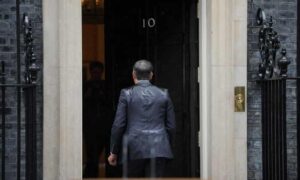
Winning five elections in a row is something no party has managed in modern times, and there are reasons for that.
Voters tire of the ruling party and want something new and fresh. Even more importantly, being in power for a long time increases the chances of bad stuff happening that tarnishes the government’s reputation. In the last 50 years, there has been a recession or economic crisis every 10 years or so on average: the mid 1970s, the early 80s, the early 90s, the late 2000s and the early 2020s.
The UK’s periodic economic struggles mean that, with hindsight, there have been some elections that were good to lose.
It was handy for the Conservatives to be kicked out of office in 1974 because it meant they did not have to clear up the mess they had made of the economy. It was Labour that had to contend with 25% inflation, industrial unrest and the arrival of a team from the International Monetary Fund demanding spending cuts in return for a loan. The Tories then returned to power in 1979 with North Sea oil at their disposal.
Likewise, Labour was fortunate to lose in 1992 because, had it not done so, it would have been Neil Kinnock rather than John Major who would have faced the humiliation of the pound being ejected from the European exchange rate mechanism by the relentless attacks of currency speculators. Black Wednesday would have occurred whichever party was in power.
But despite some healthy competition, 2019 is in a class of its own as an election worth losing. There was plenty of speculation after Boris Johnson’s decisive victory that Labour was washed up as a political force. Now it is the Conservatives who are facing an existential crisis, with the polls suggesting a defeat worse than 1997.
Rishi Sunak faces the usual problems facing the leader of a party that has been in power for a long time: boredom, and the need to defend the government’s record. A much bigger problem, though, is that since 2019 the Conservatives have had to grapple with not one but three massive economic shocks, each one of which has sapped confidence and support for the party.
The fact that two of the shocks were not of the government’s making has counted for little. There is some rough justice in this. The Conservatives came to power in 2010 after falsely blaming Gordon Brown’s Labour government for what was clearly a global financial crisis. Now they are getting some of the same treatment, and the result is likely to be the same: an unforgiving electorate booting the government that presided over a crisis (or, in this case, a rolling series of crises) out of office.
